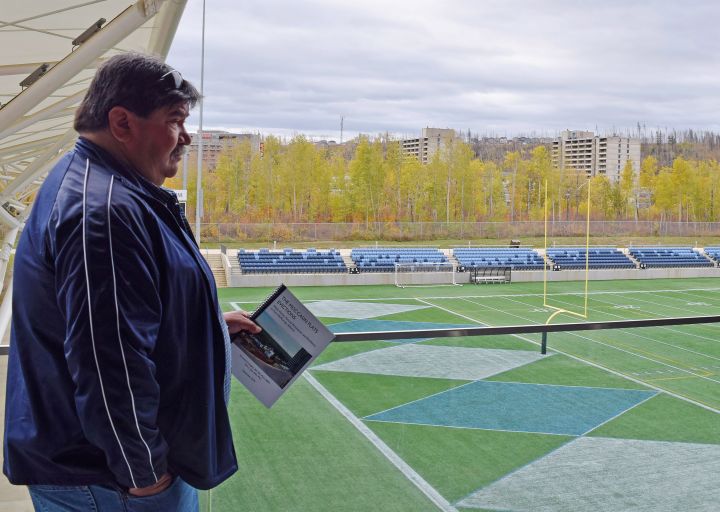The eviction four decades ago of a predominantly Metis settlement in Fort McMurray disrupted members’ traditional way of life and caused lasting economic harm to affected families, says a report released Thursday.

The land known as Moccasin Flats sits on the north end of the city’s downtown near where the Athabasca and Clearwater Rivers meet.
Earlier this year, Fort McMurray Metis Local 1935 asked researchers Hereward Longley and Tara Joly to prepare a report on the events of the late 1970s and early 1980s.
At the time, the municipality and the housing subsidiary of oilsands giant Syncrude collaborated to evict the Moccasin Flats families to make way for an apartment tower, which stands today, and a marina, which was never built, says the report.
“By calling the Moccasin Flats residents ‘squatters,’ the Town used property law to justify their eviction, and ignored the Indigenous identity, history, and rights of the Moccasin Flats residents,” it said.
There are records of Metis inhabitants there dating back to 1870, though Indigenous people lived in the region before living memory, the report said. By the 1960s and 1970s, 14 families lived there permanently and there were another 15 to 30 there seasonally.
READ MORE: What the Supreme Court’s ruling on Métis and non-status Indians changes
Joly said she and Longley relied heavily on oral history and were struck by a common theme amongst many they interviewed: Moccasin Flats was home.
“It’s kind of a simple phrase, just calling this place their home, but it really speaks to the kinds of connections that people felt to this place and still feel to the place, even after being evicted,” she said.
Joly said the evictions broke up a tight-knit community and cut people off from their traditions. Those evicted were leased trailers from the municipality, which were of substandard quality and on land that couldn’t be passed along to their children.
All this, as the booming oilsands industry caused property taxes to balloon.
The report recommends compensation, a monument and cultural centre and a land transfer.
Other recommendations include cultural education for the municipality and industry, further research, a better response to housing insecurity and a formal apology.
And it calls for construction projects that could allow the Snye — a lagoon-like body of water between the Athabasca and Clearwater just north of Moccasin Flats — to flow freely between the two rivers once again. A dike built in 1964 cuts the Athabasca off from the Snye and has altered the ecosystem.
If the recommendations are acted upon, it would be a long time coming, said Longley.
“There was a lot of advocacy for this issue by the community at the time, and protests to the evictions, but it really went nowhere.”
McMurray Metis president Gail Gallupe has asked Mayor Don Scott and Syncrude Managing Director Doreen Cole to meet before Nov. 30 to discuss the report.
She said its recommendations were “spot on.”
“They have to do something,” she said. “What happened to them, how could they pick up the pieces?”
Syncrude spokesman Leithan Slade said the company respects the desire to get to the bottom of what happened and values its relationship with local Indigenous peoples.
“Until we’ve had full time to review and completely digest this document, it would be premature to comment on any of the specifics, including those recommendations within it,” he said. “But we are committed to working with the community on this.”
Municipal spokesman Will Collins thanked those who brought this issue to the forefront.
“The municipality acknowledges what took place at Moccasin Flats, and we are committed to a spirit of reconciliation in a way that is meaningful for all those impacted by what happened.”



Comments